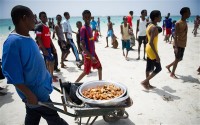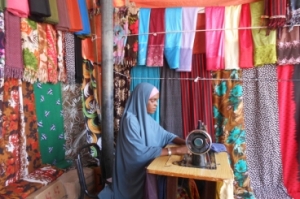by Samira Sawlani Follow @samirasawlani
“For too long, the people of Somalia have suffered from civil strife.Now is the best time for them to realize the promise that accompanied their nation’s independence. In that quest, the United States is right where it should be: on Somalia’s side. And as we support the country’s progress, our strategy is centered on three key elements: security, governance, and development. Some 130,000 Americans are of Somali heritage and of these many are deeply committed to the recovery and prosperity of their homeland. They show this commitment by sending money back to their loved ones. Today, an estimated 1/3 of the Country’s total income is derived from remittances- 1/3 of the total income of the country. This reminds us how bleak the economic picture in Somalia remains.”
These were the words of the American Under Secretary for Political Affairs, Wendy R. Sherman in 2014, when discussing U.S Foreign Policy in Somalia.
 Ironically, 8 months later the same Government that has continuously emphasised upon the importance of stability in Somalia and their commitment to supporting the regime in charge on this journey, has just cut off one of the major channels through which the Somali community in America were able to send funds back home. This money contributes directly to the rebuilding of a Country and individuals that are overcoming decades of conflict.
Ironically, 8 months later the same Government that has continuously emphasised upon the importance of stability in Somalia and their commitment to supporting the regime in charge on this journey, has just cut off one of the major channels through which the Somali community in America were able to send funds back home. This money contributes directly to the rebuilding of a Country and individuals that are overcoming decades of conflict.

Read again the statement of Wendy Sherman: the remittances form 1/3 of Somalia’s income. To be a little more specific, the African Economic Outlook 2014 puts this at an estimated $1-1.5 billion a year.
The US Government has long been concerned that money being sent back to Somalia is falling into the hands of terror  group Al-Shabaab. Thus over the last few years regulators have subjected banks to stringent regulations, the pressure of which has led many to terminate their money transfer to Somalia operations. Merchant Bank was one of the few remaining banks in the USA which continued to act as a middleman for Somali money transfer companies.
group Al-Shabaab. Thus over the last few years regulators have subjected banks to stringent regulations, the pressure of which has led many to terminate their money transfer to Somalia operations. Merchant Bank was one of the few remaining banks in the USA which continued to act as a middleman for Somali money transfer companies.
Last year it had been issued a consent order by the Office of the Comptroller of the Currency (OCC), an independent agency part of the US Treasury Department, due to concerns around money laundering compliance.
Merchant say they cannot meet the obligations stated in the consent order and so can no longer provide this service, a careless decision by the OCC and the bank with the US Government complicit in it.
The conflict in Somalia which began in 1991 following the overthrow of military dictator Mohammed Siad Barre led to the collapse of a nation which had long been renowned for its beauty, history and culture. The result was anarchy; fighting between warlords, famine, the creation of semi-autonomous regions and groups competing for control of the Country resulted in death and a mass exodus of people.
Those that were able to escape fled to neighbouring Countries, (2013 figures released by ICMC Europe state Kenya and Ethiopia host 492,046 and 240,086 Somali refugees) while many found home further afield in Europe, the USA and Canada.

Thus a vibrant Somali Diaspora community has grown in these parts of the world and while members have embraced their new home, the ties which bind them to Somalia are as strong as ever, as is their commitment to rebuilding the nation.
I spoke to 19 year old Amina Sharif, a student based in Minnesota which is home to the largest population of Somalis in the USA; “My parents left Somalia during the war. To watch your homeland be destroyed is heart wrenching. Many there survived the war however its effects mean they need help in order to afford basic things like food and paying school fees. Banks cutting the remittance channel has meant families like mine have had to find alternative ways to support those back home, it was the one way in which we felt we were contributing to bringing about some small changes.”
Ali Abdullahi, an IT analyst in California agrees stating “I was mortified when Merchant Bank of California sent out letters saying they were to close accounts of Somali-American money transfer companies. My first thought was how is my aunt who lives on the outskirts of Mogadishu and looks after her 5 young grandchildren going to survive without the money we send her every month? We send enough for her to look after the children, send them to school, pay rent and access basic healthcare for the youngest who suffers from asthma. There are smaller companies that handle remittances but they keep it low key and do not have the capacity to handle huge amounts or meet the demand of such a large Diaspora. I am dumbfounded at the US Government and concerned about what next.”
saying they were to close accounts of Somali-American money transfer companies. My first thought was how is my aunt who lives on the outskirts of Mogadishu and looks after her 5 young grandchildren going to survive without the money we send her every month? We send enough for her to look after the children, send them to school, pay rent and access basic healthcare for the youngest who suffers from asthma. There are smaller companies that handle remittances but they keep it low key and do not have the capacity to handle huge amounts or meet the demand of such a large Diaspora. I am dumbfounded at the US Government and concerned about what next.”
Journalist Abdirazaq Azize who spends his time between Mogadishu and Garowe says; ‘There is a blind man aged around 80, he has lost his sight while his wife is largely bedridden. Due to bank closures people have started sending money through informal family networks, imagine an elderly blind man having to travel far to pick up the money? Even more problematic is due to logistics how infrequent it has become.”
Also concerned is Suleqa Barre a nurse who has returned to Somalia after living in the USA for almost 15 years, “Food shortage is a problem as is access to basic services. Diaspora sent money is often invested into small businesses that can create jobs.The decision by the Americans will impact the entire economy. I know young widows with little children who have set up small businesses which are part funded by family in the Diaspora, without that they will starve.”
 So herein lays the baffling decision making of the American Government, on one hand they have harped on about wanting to support the Somali people and ridding the world of the threat from Al-Shabaab through sending in military personnel to Mogadishu to assist troops, coordinating drone attacks and the like. On the other hand they have just taken away what for many people is their major source of income, which they would use to educate their children, build a business and keep themselves and ultimately the Country on the road to recovery.
So herein lays the baffling decision making of the American Government, on one hand they have harped on about wanting to support the Somali people and ridding the world of the threat from Al-Shabaab through sending in military personnel to Mogadishu to assist troops, coordinating drone attacks and the like. On the other hand they have just taken away what for many people is their major source of income, which they would use to educate their children, build a business and keep themselves and ultimately the Country on the road to recovery.
Furthermore, this move provides Al-Shabaab with its greatest weapon; unemployed and frustrated young people. Numerous studies have found that high levels of unemployment and socio-economic frustrations provide ‘fertile ground for terrorist recruitment.’ (A 2012 UNDP Human Development report indicated that 67 percent of youth in the country are unemployed)
And who will bear the brunt of all the consequences? The people of Somalia and those in the Diaspora, who can only look on from a position of powerlessness while seeking out other alternatives.
Once again a group of wealthy, powerful and inconsiderate men and women have sat in a boardroom in America, sipping on coffee from Kenya eating pastries stuffed with chocolate made with cocoa from Ghana and made a careless decision which will affect people thousands of miles away.
People whose lives seem to just not matter.
Support the campaign to reverse the decision using #ifundfoodnotterror and #somalis4remittances
______________________________________________
All work published on Media Diversified is the intellectual property of its writers. Please do not reproduce, republish or repost any content from this site without express written permission from Media Diversified. For further information, please see our reposting guidelines.
____________________________________________________
Samira Sawlani is a writer and journalist specialising in politics, economy and development of East and Horn of Africa, in particular Kenya, Uganda and Somalia. She also writes fiction and human interest stories. A holder of an MA in International Studies and Diplomacy from the School of Oriental and African Studies, London she has previously worked with the Commonwealth Secretariat and as an International Election Observer for the Kenyan elections in 2013. Aside from journalism she has also worked in the emergency humanitarian relief and refugee care sector. Twitter: @samirasawlani
Related articles
- “I belong deeply to myself” by Somali Art (mediadiversified.org)
- 10 Poets of Colour we Discovered (or Rediscovered) in 2014 (mediadiversified.org)

Samira does a Samira. Touché. Classique.
LikeLike